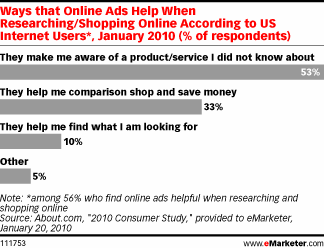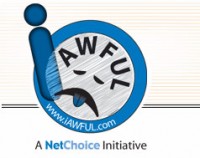By Adam Thierer & Berin Szoka
Progress & Freedom Foundation Progress Snapshot No. 6.5, Feb 2010 [.pdf]
 Advertising is increasingly under attack in Washington. In fact, we’re busy finishing up a paper with the working title: “The New Assault on Advertising: What it Means for the Future of Media & Culture.” Among other things, the paper inventories the many ways in which policymakers in Washington and elsewhere are stepping up regulation of commercial advertising and marketing efforts-and highlights the common themes that unite them. Unfortunately, the report is already over 50 pages long and we keep finding new threats to discuss!
Advertising is increasingly under attack in Washington. In fact, we’re busy finishing up a paper with the working title: “The New Assault on Advertising: What it Means for the Future of Media & Culture.” Among other things, the paper inventories the many ways in which policymakers in Washington and elsewhere are stepping up regulation of commercial advertising and marketing efforts-and highlights the common themes that unite them. Unfortunately, the report is already over 50 pages long and we keep finding new threats to discuss!
This regulatory tsunami could not come at a worse time, of course, since an attack on advertising is tantamount to an attack on media itself, and media is at a critical point of technological change. As we have pointed out repeatedly, the vast majority of media and content in this country is supported by commercial advertising in one way or another-particularly in the era of “free” content and services.[1]
An Attack on Advertising Will Hurt Consumers
But there’s a more important reason to fear Washington’s new war on advertising: It will hurt consumer welfare. That’s because advertising provides important information and signals to consumers about goods and services that are competing for their attention and business—and that scarcest of all things in the modern world, consumers’ attention. Continue reading →
A few weeks ago, I posted my thoughts on the outstanding new PBS Frontline program called “Digital Nation: Life on the Virtual Frontier.” Produced by Rachel Dretzin and Douglas Rushkoff, the 90-minute special touched on several themes we have debated here through the years including: (1) concerns about information overload and multitasking; (2) the role of computers and digital technology in education & learning; and (3) the nature and impact of virtual reality and virtual worlds on real-world life and culture.
If you missed the program, you’re in luck. The Family Online Safety Institute (FOSI), in conjunction with the National Cable & Telecommunications Association (NCTA), is holding a screening of the documentary this Thursday, Feb. 25th beginning at 10:00am. The screening will take place at the NCTA Theater, located at 25 Massachusetts Avenue, NW (near Union Station).
After the viewing ends, Rachel Dretzin will be answering some questions about the program. And the folks at FOSI were kind enough to ask me to be there to provide some commentary on the program along with Kathy Brown, Senior Vice President, Public Policy Development and Corporate Responsibility at Verizon.
They’re almost out of seats, so if you are interested you should RSVP right away to: events@fosi.org [All details here.]
Are you a tech policy geek? Do you have a strange infatuation with nerdy communications, media, and Internet policy matters? Then you probably need to get out more and get a life. Then you should be watching C-Span’s outstanding program “The Communicators“! It’s a half-hour weekly program featuring a different guest expert (or 2) discussing hot topics and developments in the fields of telecom regulation, media policy, and cyberlaw.
This week’s show featured Kyle McSlarrow, President & CEO National Cable & Telecommunications Association (NCTA), as well as one of the nation’s finest beat reporters in this arena, Kim Hart, who writes for The Hill and the excellent Hillicon Valley blog. Their “Communicators” discussion an interesting conversation about the FCC, the agency’s national broadband plan, Net neutrality, universal service subsidies, Google’s rising influence in Beltway debates, and more. Other recent “Communicator” guests, among many others, have included: Continue reading →
From my undulating perch on an elliptical machine last night, I saw that CNN was broadcasting a strange roundtable event called “cyber.shockwave”—they occasionally displayed a subhead saying something like “you were warned.”
It was a group of (mostly) former Bush Administration officials sitting around making their pitch that we should be frightened about yet another menace and that our salvation is to run to the arms of government (especially if it’s controlled by their party). The CNN airing of it was illustration of how politics and public policy are collapsing together with entertainment—reality TV, specifically. The government “experts” were actors in a play dressed up as a newscast.
This post at “Crabbyolbastard Ruminates” captures my sense of what was going on. (“I see that we as a country are being led by blithering Luddites . . .”) As reported by Crabbyol’, the ideas they discussed included: pulling the plug on the Internet, pulling the plug on the cell phone networks, and nationalizing the telco and power companies.
D33PT00T tweets, cleverly, “ok my phn doesn’t work & Internet doesn’t work – ths guys R planning 2 run arnd w/ bullhorns ‘all is well remain calm!'”
Maybe it’s coincidence that Republicans dominated the scene. It was an event put together by the “Bipartisan Policy Center.” But that just goes to show that there is bipartisan agreement on one thing in Washington, D.C.: The government should control more of the society.
The U.S. federal government is not where the action is on “cybersecurity.” It is the responsibility of coders, device manufacturers, network operators, data holders, and ordinary computer users. The CNN broadcast of this event mislead viewers into thinking that cybersecurity is the government’s responsibility and that the government will lead any response to security failures.
Heaven help us if that becomes the reality.
Oh my, here we go again with bogus accusations of “censorship” flying about a private company’s efforts to self-regulate its own media platform. Yesterday over at Silicon Alley Insider, Nick Saint penned a piece on how, “Apple’s War On Porn Is Just Getting Started.” And then over at TechCrunch, Jason Kincaid wrote about “Why Apple’s New Ban Against Sexy Apps Is Scary.” That yielded a flurry of similarly-titled rants about Apple’s supposedly totalitarian ways for taking away our new-found inalienable human right to unfettered porn and adult entertainment applications via our iPhones. To Mr. Saint, Mr. Kincaid, and the many others who apparently believe Apple is the reincarnation of Big Brother for self-regulating their own Apps Store, all I can say is: Grow up!
Here are a few things they need to consider:
- What Apple decides to do with its application store, and what it chooses to provide in it, is Apple’s own business—quite literally. Like a traditional bricks-and-mortar retailer, they can make policies about what types of content might be deemed too sensitive for the broad community of customers they serve. WalMart, for example, doesn’t carry certain types of music in their stores. If customers don’t like what those retailers are doing, there’s always another place for them to take their business and find what they are looking for.
- When it comes to the Apple controversy, we are generally talking about porn. Note to Mr. Saint and Mr. Kincaid and other whiners… there are plenty of other places to find porn on the Net! Seriously, have you looked?
- A private company’s decision to self-censor by not carrying something in their store is not even in the same universe as the sort of censorship we see government officials engage in, which blocks all content from all platforms. There is no escape from that sort of all-encompassing censorship. Continue reading →
I’ve always viewed web traffic numbers with great suspicion, if for no other reason than they are all over the board. But the amazing Carl Bialik, the Wall Street Journal’s “numbers guy,” does us another great service today in his latest column, “The Trouble With Web-Traffic Numbers,” by walking us through exactly how big of a mess these numbers really are. Carl is the closest thing we have to a statistical ombudsman for the Internet as he repeatedly illustrates in his column how numbers can deceive and distort.
In terms of bogus web traffic numbers, there’s plenty of distortion going on. He quotes Erin Pettigrew, marketing director for Gawker Media, as saying that “For an industry that relies so heavily on accurate data and numerical accountability, relying on an estimate is embarrassing, antiquated.” Too true. Of course, with so many people frequently deleting their cookies and now accessing websites from different machines, it’s not surprising that the numbers are such a jumble.
One of the reasons it’s so important to try to improve web traffic metrics is because it is essential to the advertising business, which powers the web and all the great content and services we consume online. More accurate web traffic metrics can help better direct and target ads across the web. But it won’t be easy.
Anyway, read Carl’s piece for all the details. And thank you Carl for always reminding us that there are “lies, damned lies, and statistics.”
Last July, Adam Thierer and I argued in a Forbes.com piece that the Microsoft/Yahoo! search partnership should be cause for “celebration among as a good thing for consumers. By providing a strong competitor with a combined 28% market share, the deal should also be a source of relief at Google, which has come under increasing attack for its supposed market dominance.” Today, 205 days later, the companies have finally announced that EU and US antitrust regulators have approved their deal.
So… how does a delay of nearly seven months help consumers? Wouldn’t we be better off if the two companies had been able to start working together immediately to develop a stronger search engine competitor without this “Mother, May I?” routine?
Last year, I described how Microsoft’s delayed entry into search advertising put them at a serious disadvantage in competing with Google. (The company dithered over buying search ad startup Overture and ultimately decided to build its own system—which proved a serious miscalculation.) I’ll just reiterate what we said about the Yahoo!/Microsoft deal when it was first announced.
Yahoo!/Microsoft pact is just the latest pairing of Web 1.0 titans struggling to reinvent themselves and compete with Google, a titan that still thinks of itself as a start-up. All three companies will struggle to meet new challenges as search evolves toward the social(reflecting what your friends like), the semantic (reflecting the precise, rather than presumed, meanings of Web content), the personalized (reflecting your own preferences) and the interactive (including user-generated comments or reviews)…. Continue reading →
If a tree falls in the forest, who cares who hears it?
But when we “publish,” “speak” or “share” online, we often do care who hears it. While millions of users eagerly share huge amounts of information about themselves and their activities by posting status updates, photos, videos, events, etc., nearly everyone would rather limit some of their sharing to a select circle of contacts. For some users (and in some situations), that circle might be quite small, while it could be very large or unlimited for other users or situations. How public is too public when it comes to what we share about ourselves? Personalizing our audience is something we each have to decide for ourselves depending on the circumstances—what I would call “publication privacy.” (It’s a potentially ambiguous term, I’ll grant you, since “publication” still doesn’t obviously refer to user-generated content in everyone’s mind, but I think it’s more clear than “Sharing Privacy,” since “publication” is a subset of the information we “share” about ourselves.)
For all the talk about the “Death of Privacy“—be that good, bad, or simply inevitable—publication privacy is thriving. Twitter, most famously, offers users only the binary choice of either locking down their entire feed (so that you have to approve requests to “follow” you) or making it public to everyone on the service. But just in the last two months, we’ve seen a sea change in the ability of users to manage their publication privacy.
Facebook’s Publication Controls
First, in December, Facebook began offering users the ability to control access to each and every piece of content they share—like so:
 Continue reading →
Continue reading →
 It was an awfully bad snowfall that paralyzed Washington, DC last week. And though we may curse Old Man Winter, ‘tis still the season for snow. Unfortunately, it’s also the season for a flurry of bad legislation – and we’re already trying to dig-out the Internet from a pile of bad proposed state and federal laws.
It was an awfully bad snowfall that paralyzed Washington, DC last week. And though we may curse Old Man Winter, ‘tis still the season for snow. Unfortunately, it’s also the season for a flurry of bad legislation – and we’re already trying to dig-out the Internet from a pile of bad proposed state and federal laws.
So far this year there have been hundreds of bills introduced nationwide, many that impact the Internet. That’s why today NetChoice released its first iAWFUL list of 2010, taking stock of the most serious legislative threats facing the global Internet.
The Internet Advocates’ Watchlist for Ugly Laws (iAWFUL) is our top ten – or more accurately, “bottom ten” – list of the worst proposed Internet laws in America. We have Congress and 16 states represented on our list (the same bad bills often spread to multiple states).
Our #1 iAWFUL bill is a Congressional bill (HR4173) that would expand the FTC’s rulemaking power. Buried in the 1700 pages plus of the Wall Street Reform and Consumer Protection Act of 2009 is a four page amendment to the FTC Act that would dramatically increase the FTC’s rulemaking authority. This expansion would mean the removal of significant procedural safeguards that have existed for the past thirty-five years. Given the aggressively pro-regulatory statements made by FTC officials on privacy and online media, expanded powers could do serious damage to online services and Internet innovation. Reporter Grant Gross wrote a good article recapping the issue here.
#2 on the iAWFUL list are the advertising nexus bills in Colorado (SB 1193), Illinois (SB 3353), Maryland (SB 824), New Mexico (HB 50), Virginia (SB 660) and Vermont (HB 661). These bills declare that some forms of Internet advertising are equivalent to having sales agents in their states. All these states want to force out-of-state advertisers to collect and remit sales tax on sales to their residents. These nexus bills are popping up everywhere, whack-a-mole style.
Check out #3 – #10. Hopefully DC is done for the year with snow. Regardless, I’ll still need my snow shovel to help dig the Internet out from a blizzard of bad legislation.
 Advertising is increasingly under attack in Washington. In fact, we’re busy finishing up a paper with the working title: “The New Assault on Advertising: What it Means for the Future of Media & Culture.” Among other things, the paper inventories the many ways in which policymakers in Washington and elsewhere are stepping up regulation of commercial advertising and marketing efforts-and highlights the common themes that unite them. Unfortunately, the report is already over 50 pages long and we keep finding new threats to discuss!
Advertising is increasingly under attack in Washington. In fact, we’re busy finishing up a paper with the working title: “The New Assault on Advertising: What it Means for the Future of Media & Culture.” Among other things, the paper inventories the many ways in which policymakers in Washington and elsewhere are stepping up regulation of commercial advertising and marketing efforts-and highlights the common themes that unite them. Unfortunately, the report is already over 50 pages long and we keep finding new threats to discuss!


 The Technology Liberation Front is the tech policy blog dedicated to keeping politicians' hands off the 'net and everything else related to technology.
The Technology Liberation Front is the tech policy blog dedicated to keeping politicians' hands off the 'net and everything else related to technology.